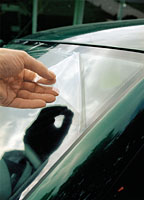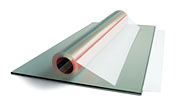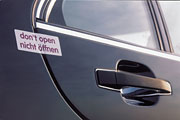Bayer Launches Raw Materials for High-Grade Adhesives
EVM Copolymers Exhibit High Vinyl Acetate Content


Levamelt is the name for a series of ethylene-vinyl acetate copolymers that can outperform alternatives in a range of applications, either as hot melt or solventborne adhesives. Levamelt is expected to become the material of choice and common 'bond' for use in such diverse applications as baby diapers, bookbinding, woodwork, running shoes, and protective films for automobile manufacturing and other valuable surfaces, e.g., liquid-crystal display (LCD) screens.
According to Ron Norris, Bayer Rubber's director, Marketing, for NBR, EPR and CR, Levamelt paves the way for producing a variety of tailor-made films for applications in automobile assembly, woodworking and joinery, bookbinding and graphics industries, packaging, disposable products, flexible laminates, footwear, tapes and labels, and product assembly and sealants.
Norris says, "Ethylene and vinyl acetate copolymers (EVM) are well known as adhesives raw materials. What makes the Levamelt family of ethylene-vinyl acetate copolymers stand out is the amount of vinyl acetate -- from 40 to 80 percent. (Bayer is the only manufacturer capable of achieving these levels.) The polymer backbone consists of fully saturated methylene units with acetate groups attached."
Normally, the ethylene-vinyl acetate copolymers used as adhesives contain less than 40 percent of vinyl acetate. Raising the vinyl acetate content affects both the cystallinity and the glass-transition temperatures, important properties with respect to polymer flexibility.

Levamelt can be manufactured into highly uniform cast or blown films, and can form extremely thin adhesive layers. It is also completely transparent and ozone resistant, showing immediate and constant tack while being applied.
One of the significant benefits of Levamelt is it does not require the addition of plasticizers and resins. "There is no migration or reaction with the substrate layer," notes Norris. "This product really offers our customers a range of pressure sensitive adhesives (PSAs) that can be customized for each application. Not only can it be blended with polyolefin grades, but unlike other PSAs, Levamelt grades are compatible with other PSA materials -- that's a real plus."
Looking for a reprint of this article?
From high-res PDFs to custom plaques, order your copy today!



